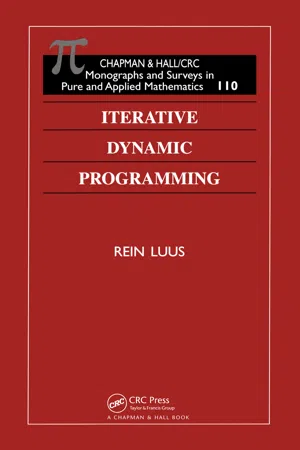
- 344 pages
- English
- ePUB (mobile friendly)
- Available on iOS & Android
eBook - ePub
Iterative Dynamic Programming
About this book
Dynamic programming is a powerful method for solving optimization problems, but has a number of drawbacks that limit its use to solving problems of very low dimension. To overcome these limitations, author Rein Luus suggested using it in an iterative fashion. Although this method required vast computer resources, modifications to his original schem
Tools to learn more effectively

Saving Books

Keyword Search

Annotating Text

Listen to it instead
Information
Chapter 1
Fundamental concepts
1.1 Introduction
Optimization, or optimal control, in the sense to be used in this book, is concerned with determining the largest value or the smallest value for some criterion of performance. For example, if we are dealing with economic benefit, then we would like to choose the conditions for operating the system so that the economic benefit would be maximized. If, however, the criterion of performance is chosen to be the cost, then the system should be operated to minimize the cost. In each case we seek the operating conditions that yield the extreme value for the performance criterion.
It is obvious that the operating procedure is dictated by the choice of the criterion of operation. The choice of such criterion is not straightforward, since there are numerous factors that must be taken into consideration, such as productivity, profit, cost, environmental impact, reliability, yield of a reactor, quality of product, etc. We may want to have more than one criterion for optimization. For the present work, however, we assume that all the objectives can be expressed in terms of an appropriate scalar criterion of performance which we call performance index, with the understanding that the optimization results will be dependent on such a choice. It is also important to express this performance index in terms of the same variables that are used in the mathematical model of the physical system or process under consideration.
For the development of the mathematical model of the system, we need some insight into the behavior of the physical system, and how the variables at our disposal may be used to change its behavior. Such a relationship may be expressed in terms of algebraic equations, ordinary differential equations, difference equations, partial differential equations, integral equations, or combinations of them. The simplest situation arises, of course, if the model is described in terms of ...
Table of contents
- Cover
- Half Title
- Series Page
- Title Page
- Copyright Page
- Dedication
- About the author
- Preface
- Notation
- Table of Contents
- 1 Fundamental concepts
- 2 Steady-state optimization
- 3 Dynamic programming
- 4 Iterative dynamic programming
- 5 Allowable values for control
- 6 Evaluation of parameters in IDP
- 7 Piecewise linear control
- 8 Time-delay systems
- 9 Variable stage lengths
- 10 Singular control problems
- 11 State constraints
- 12 Time optimal control
- 13 Nonseparable problems
- 14 Sensitivity considerations
- 15 Toward practical optimal control
- A Nonlinear algebraic equation solver
- B Listing of linear programming program
- C LJ optimization programs
- D Iterative dynamic programming programs
- E Listing of DVERK
- Index
Frequently asked questions
Yes, you can cancel anytime from the Subscription tab in your account settings on the Perlego website. Your subscription will stay active until the end of your current billing period. Learn how to cancel your subscription
No, books cannot be downloaded as external files, such as PDFs, for use outside of Perlego. However, you can download books within the Perlego app for offline reading on mobile or tablet. Learn how to download books offline
Perlego offers two plans: Essential and Complete
- Essential is ideal for learners and professionals who enjoy exploring a wide range of subjects. Access the Essential Library with 800,000+ trusted titles and best-sellers across business, personal growth, and the humanities. Includes unlimited reading time and Standard Read Aloud voice.
- Complete: Perfect for advanced learners and researchers needing full, unrestricted access. Unlock 1.4M+ books across hundreds of subjects, including academic and specialized titles. The Complete Plan also includes advanced features like Premium Read Aloud and Research Assistant.
We are an online textbook subscription service, where you can get access to an entire online library for less than the price of a single book per month. With over 1 million books across 990+ topics, we’ve got you covered! Learn about our mission
Look out for the read-aloud symbol on your next book to see if you can listen to it. The read-aloud tool reads text aloud for you, highlighting the text as it is being read. You can pause it, speed it up and slow it down. Learn more about Read Aloud
Yes! You can use the Perlego app on both iOS and Android devices to read anytime, anywhere — even offline. Perfect for commutes or when you’re on the go.
Please note we cannot support devices running on iOS 13 and Android 7 or earlier. Learn more about using the app
Please note we cannot support devices running on iOS 13 and Android 7 or earlier. Learn more about using the app
Yes, you can access Iterative Dynamic Programming by Rein Luus in PDF and/or ePUB format, as well as other popular books in Mathematics & Applied Mathematics. We have over one million books available in our catalogue for you to explore.